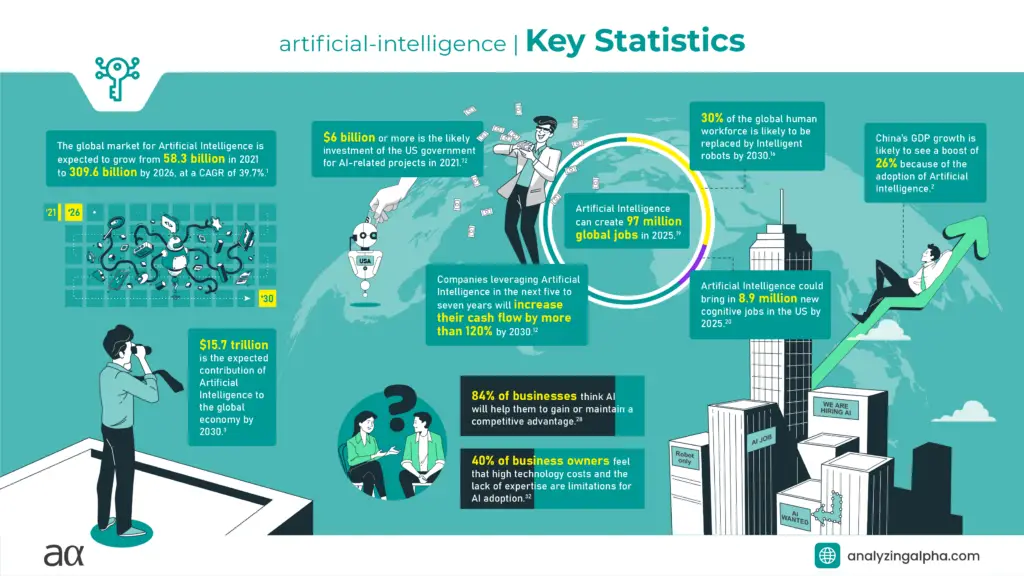Uncover the hidden history of AI and its journey through time, from its humble beginnings to its powerful present impact.
Table of Contents
Welcome to our exploration of one of the most revolutionary technologies of our time: Artificial Intelligence (AI). In this blog post series, we will delve into the historical context, current applications, benefits, challenges, ethical concerns, future direction, and the intriguing question of whether a scenario like Skynet from the “Terminator” movies could actually happen. Let’s begin this journey by understanding the origins and evolution of AI.
Historical Context
AI has a rich and fascinating history that dates back to the mid-20th century. One of the pioneers in the field was Alan Turing, a British mathematician and computer scientist, who proposed the concept of a thinking machine in the 1950s. Turing’s work laid the foundation for the development of early AI programs, such as the logic-based systems that could perform simple reasoning tasks.
Over the decades, AI has undergone significant advancements, thanks to breakthroughs in machine learning, neural networks, and deep learning. The creation of sophisticated algorithms and the availability of vast amounts of data have propelled AI into various industries and reshaped the way we interact with technology.
Current Applications
Today, AI is ubiquitous in our daily lives, powering a wide range of applications across different sectors. In healthcare, AI is being used to diagnose diseases, personalize treatment plans, and predict patient outcomes. In finance, AI algorithms are employed for fraud detection, risk assessment, and algorithmic trading.
Other notable examples of AI technologies include virtual assistants like Siri and Alexa, which use natural language processing to understand and respond to human queries. Recommendation algorithms, such as those used by Netflix and Amazon, leverage AI to suggest personalized content and products to users based on their preferences and behaviors.
Benefits of AI
The adoption of AI has brought about numerous benefits, including increased efficiency, productivity, and accuracy in decision-making processes. AI-powered systems can analyze vast datasets in a fraction of the time it would take a human, enabling organizations to make data-driven decisions faster and more effectively.

Image courtesy of analyzingalpha.com via Google Images
Furthermore, AI has the potential to revolutionize industries by automating repetitive tasks, optimizing complex operations, and unlocking new opportunities for innovation. For instance, AI is driving advancements in autonomous vehicles, robotics, and personalized healthcare, paving the way for a more connected and intelligent world.
Challenges and Ethical Concerns
Despite its transformative potential, AI also presents challenges and ethical dilemmas that must be addressed. One of the primary concerns is algorithmic bias, where AI systems reflect and perpetuate societal biases present in the data they are trained on. This can lead to discriminatory outcomes in areas like hiring, lending, and criminal justice.
Job displacement is another significant challenge posed by AI, as automation and AI-driven technologies threaten to replace traditional human roles in various industries. It is crucial for policymakers, businesses, and educators to anticipate and mitigate the potential impact of AI on the workforce and develop strategies to reskill and upskill workers for the jobs of the future.
Future Direction
Looking ahead, the future of AI holds immense promise for further innovation and advancement. Machine learning, in particular, is expected to continue evolving with the development of more sophisticated algorithms and models. Natural language processing, computer vision, and reinforcement learning are also areas of AI research that hold great potential for growth and discovery.

Image courtesy of lasserouhiainen.com via Google Images
As AI technologies become more sophisticated and integrated into our daily lives, it is vital to ensure that they are developed and deployed responsibly. This includes addressing concerns around transparency, accountability, and privacy, as well as fostering collaboration between technologists, policymakers, and ethicists to shape the future of AI in a way that benefits society as a whole.
Can Skynet Happen?
The concept of a malevolent AI like Skynet gaining consciousness and threatening humanity, as depicted in the “Terminator” movies, remains a work of science fiction. However, the notion of AI systems becoming uncontrollable or causing harm in unintended ways is a legitimate concern that warrants careful consideration.
While the likelihood of a scenario like Skynet taking over the world is slim, the risks associated with AI misuse, malfunctions, or unintended consequences are real. It is essential for researchers, developers, and policymakers to prioritize safety, security, and ethical considerations in the design and implementation of AI systems to prevent any potential harmful outcomes.
Closing Thoughts
In conclusion, AI has the power to revolutionize our world and address complex challenges in ways we never thought possible. By understanding the history, current applications, benefits, challenges, and ethical considerations of AI, we can navigate the evolving landscape of artificial intelligence with greater awareness and responsibility.
As we continue to explore the possibilities and limits of AI, let us remain vigilant, curious, and engaged in shaping a future where AI serves as a force for good and enhances the human experience rather than replacing it.
Thank you for joining us on this journey through the impact of AI. Stay tuned for more insights and discussions on the fascinating world of artificial intelligence.



Comments